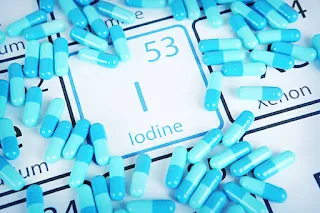Understanding Iodine Deficiency: Symptoms, Causes, and Treatment
Iodine is an essential mineral crucial for the production of thyroid hormones, which regulate many vital bodily functions, including metabolism, brain development, and overall growth. A deficiency in iodine can lead to various health issues, some of which can be severe if left untreated. This article explores the symptoms, causes, and treatment options for iodine deficiency.
Symptoms of Iodine Deficiency
Iodine deficiency can manifest in several ways, often affecting different systems in the body:
1. Goiter: One of the most common symptoms is the development of a goiter, an enlargement of the thyroid gland, which may cause visible swelling in the neck.
2. Hypothyroidism: Low iodine levels can lead to hypothyroidism, characterized by symptoms such as fatigue, weight gain, cold intolerance, and dry skin.
3. Cognitive Impairment: Iodine deficiency, especially during pregnancy and early childhood, can lead to developmental delays and cognitive impairments.
4. Hair Iodine Deficiency: Symptoms, Causes, and Treatment Loss**: Insufficient iodine can result in thinning hair or hair loss due to impaired thyroid function.
5. Dry, Flaky Skin: The skin may become dry, flaky, and prone to irritation when iodine levels are low.
6. Depression and Mood Swings: Low thyroid hormone levels due to iodine deficiency can lead to mood disorders such as depression.
7. Weakness and Fatigue: Iodine deficiency can cause a general feeling of weakness and persistent fatigue, even with adequate rest.
Causes of Iodine Deficiency
Iodine deficiency can occur due to several factors, some of which include:
1. Inadequate Dietary Intake: Iodine is primarily found in seafood, dairy products, and iodized salt. A diet lacking these foods can lead to deficiency.
2. Geographic Factors: People living in regions with iodine-poor soil, such as mountainous areas or areas far from the sea, may have limited access to iodine-rich foods.
3. Pregnancy and Lactation: During pregnancy and breastfeeding, the body’s iodine requirements increase significantly, making deficiency more likely if intake is not adjusted.
4. Certain Diets: Strict vegan or vegetarian diets that exclude iodine-rich foods can increase the risk of deficiency.
5. Exposure to Goitrogens: Certain foods, such as cruciferous vegetables (e.g., cabbage, broccoli), can interfere with iodine absorption and thyroid function, especially if consumed in large amounts without adequate iodine intake.
Treatment for Iodine Deficiency
The treatment for iodine deficiency involves dietary changes and, in some cases, supplementation:
1. Iodized Salt: The most common and effective way to prevent and treat iodine deficiency is by using iodized salt in cooking and at the table.
2. Dietary Sources: Increasing the intake of iodine-rich foods such as seaweed, fish, dairy products, and eggs can help restore iodine levels.
3. Iodine Supplements: For individuals who cannot meet their iodine needs through diet alone, iodine supplements may be prescribed by a healthcare provider. It’s important to follow the prescribed dosage, as excessive iodine can also cause health issues.
4. Monitoring and Adjusting: In cases of severe deficiency or if thyroid function is impaired, regular monitoring of iodine levels and thyroid function tests may be necessary. Treatment plans may need to be adjusted based on these results.
Conclusion
Iodine deficiency is a preventable condition that can have significant health consequences if left untreated. By recognizing the symptoms early and understanding the causes, individuals can take steps to ensure they receive adequate iodine through diet or supplementation. Maintaining sufficient iodine levels is essential for overall health, particularly for thyroid function, cognitive development, and metabolic regulation.


